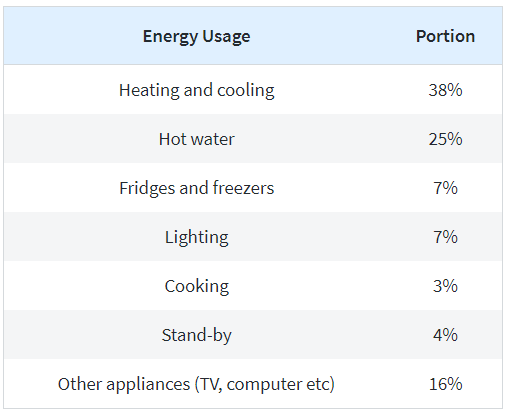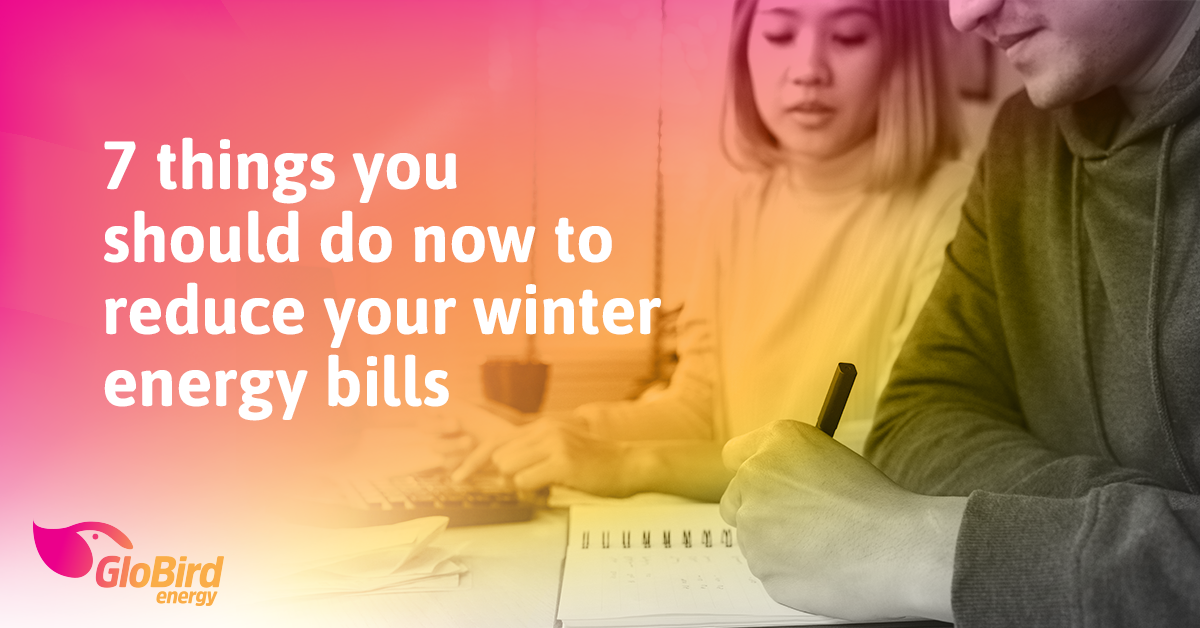Given the current stay-at-home directives from the Government, it looks like a lot of households might be occupied for more hours per day than in previous years as the cold weather starts to set in.
That will inevitably mean higher energy use and correspondingly bigger bills.
So, if ever there was an incentive to do some things to lower your energy usage, particularly when it comes to heating, now is the time to get on top of it.
After all, heating and cooling accounts for about 40 per cent of the average household energy bill (across Australia), while hot water systems account for another 25 per cent.

We’ve come up with a few things that you can do right now to get your home ready for winter so that you use less energy for heating and reduce your bills, accordingly. Reducing winter energy bills can be done with simple planning.
Keep in mind that even if you spend a bit of money doing any of these things, you’ll be saving not just this year, but every year from now on.
1. Pre-Pay to smooth out your bills
If you’re like most households, 66 per cent of your annual gas usage comes in the three months of winter, with the other 33 per cent spread over the rest of the year. That means your gas bills are likely to be relatively low for nine months and relatively high for the winter months.
We’ve noticed that many customers pay a little more than the total of each bill during the non-winter months to build up an account credit buffer to help them reduce the impact of the extra usage in winter. Smaller, more even amounts are a good way to smooth out your annual billing curve
This blog post explains how bill smoothing can help your budgeting.
2. Heavier curtains
Large expanses of glass might be great to take in the views, but those floor-to-ceiling windows cool down fast when the temperature outside drops, and they’re then cold on both sides.
So, it’s well worth investing in floor-length thermal curtains to trap the cold right there. Think of it as turning a wall of cold glass into a wall of much-less-cold material, preferably material that traps the heat in the room where you want it.
It’s important that curtains fall well below the window frame, preferably all the way to the floor.
If you can hang heavier curtains throughout the house, you’ll save quite a bit on that heating you’ve been wasting warming up the windows and fighting the influence of the cold air … but remember to open the curtains when the sun is shining on windows to let the natural heat in.
This might seem fairly simple, but we know that not everyone does the simplest things. You can find four other simple energy-saving tips in this blog post.
3. Ducted heat transfer
A builder can assess the practicality and potential value of adding a ducted heat transfer system in your ceiling.
This would either take heated air from high-traffic areas and circulate it to cooler parts of the house or use the warmer air that accumulates in the roof cavity (keeping in mind that hot air rises) and direct that down into the living spaces.
4. Seal air leaks
A draught coming in under a door might be an easy one to feel and an easy one to reduce with a simple sausage – a draft arrester, stopper, excluder, door snake, or whatever you call it.
However, there are plenty of other candidates for letting the cold air leak in during winter. Ideally, you could get a professional energy audit, which will also identify areas that need better insulation. But having a good look around can often reveal some obvious gaps to seal.
To check how well your windows and doors shut out the cold, just take a note out of your purse or wallet and shut the door or window on it. If you can pull it out without much drag, you’re losing energy through that gap.
As well as checking around window and door frames, check out:
- fireplaces and chimneys
- attic hatches
- wall- or window-mounted air conditioners
- where dryer vents pass through walls
- vents and fans
- cable TV and phone lines
- electrical and gas service entrances
- electrical outlets and switch plates
- pipes (for example under the sink).
If you think a draught isn’t that big a deal, check out our blog post about your home’s energy efficiency, which notes that improving the energy efficiency of your home can reduce your energy bills by as much as 40 per cent, which could be a saving of around $1000 a year for the average household.
5. Clean your heater
Cleaning the filters on your heater will ensure it runs efficiently. That includes making sure all the ducts of your ducted system are clean and clear of obstructions. And while you’re at it, consider closing the ducts in any rooms that really don’t need to be heated all the time (you can open them if you need to when you’re using those rooms).
This tip and the one above are also mentioned in our post 13 super simple energy-saving ideas for winter, along with this one:
Rug up
Rather than turning up the heat, wear some extra winter layers. Get yourself some fleecy tops and tracksuit pants and some warm indoor socks. And you don’t have to be a granny to put a nice rug over your legs when you’re being a couch potato!
6. Check your hot water system
Having shorter showers saves a lot of energy, and showers use a lot less hot water than baths (if your kids are used to having a bath most nights, maybe the coming of winter is a good time to work out a roster – perhaps a bath every other night, or three specific nights each week).
Meanwhile, if you’ve had your hot water system for a while, it’s worth having it checked to make sure it’s running at maximum efficiency and with no major energy-consumption issues.
If you’re about due for a new system, check out Rheem’s online Running Cost Estimator, which lets you get an idea of how different types of water heaters compare, even taking your location into account (so it can calculate how much energy is needed to heat water to 65 degrees).
7. Sit the family down
This isn’t one of those difficult chats to have. Just plan which rooms will be heated and which rooms won’t, then make sure everyone knows to keep those internal doors closed. After all, there’s no point heating the laundry, any storage rooms, or bathrooms when they’re not in use, and you don’t want the cold air from those rooms infiltrating the warmer parts of the house.
You can also discuss the thermostat setting (between 18 and 20 degrees), the timing of the heating coming on in the morning (15 minutes before you get up is enough – just because you have a cheap energy deal, you don’t need the whole house to be heated to toasty-warm levels before you even get out of bed), and even whether anyone in the family needs some new indoor gear, like fleecy tracksuit pants or indoor socks.
In fact, why not ask every member of the family to come up with an energy-saving idea? Here are 8 creative ideas to get yours flowing!
Just imagine how you’ll feel if a little bit of planning, a few small changes, and a couple of dollars spent now ends up saving you hundreds of dollars a year, every year, from now on.
You can start with the quickest and easiest thing: checking if GloBird can save you money … or rather how much we can save you!

